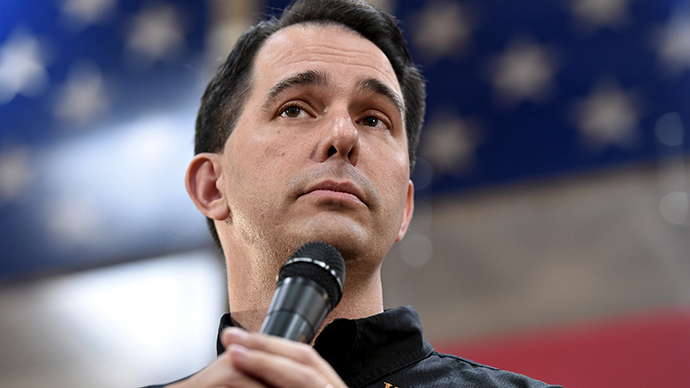Wisconsin governor strips workers’ wage protections

With the stroke of a pen, Wisconsin’s governor passed a two-year spending bill which also strikes down a key wage protection law. The prevailing wage law ensured government contract workers were paid comparable rates in any given industry.
“With this budget, taxpayers come first,” said Republican Governor Scott Walker announcing the passage of his $72.7 billion biennial budget.
Calling the prevailing wage law a “depression-era…mandate that artificially increases the costs of construction,” Walker said he was reforming government through its repeal. He said local government would be exempt from the mandate, “savings millions for our schools, technical colleges and other local governments.”
1st public worker bargaining, then right to work, now Scott Walker eliminates prev wage and labor law enforcement. http://t.co/DSfflHT5SH
— Caitlin (@unionista27) July 14, 2015
Walker, also a GOP presidential candidate, added that the budget ensures that state government will have to operate within the means of its taxpayers and be more efficient, effective and accountable.
Wisconsin law currently says employers must pay a “living wage,” which is defined as pay that offers “minimum comfort, decency, physical and moral well-being.” Walker has long insisted the state’s $7.25 an hour minimum wage is the same as a “living wage.” A 40-hour work week at that pay scale would provide $1,160 in pre-tax income a month.
At those type of minimum wage levels, “a person…gets by only with help from family, friends, or some sort of publicly supported assistance,” said Ianta Summers from the Center for American Progress.
The repeal of the prevailing wage law also does away with the ability of the state’s Department of Workforce Development to determine what constitutes a living wage. Previously, the department would convene a wage council comprised of employers, employees and the public to assist in investigations and make recommendations.
READ MORE: Wisconsin approves union-killing 'right-to-work' bill, governor expected to sign
The repeal is also seen as an attack on 100 workers who, with the aid of Jobs Now, a Wisconsin liberal advocacy group, used the “living wage” law last fall to force the Workforce department to consider whether they were being paid enough. The department concluded they were being paid a living wage, but the workers filed a lawsuit contesting its decision.
“This is literally silencing the voices of hundreds of workers who have stepped out of the shadow of poverty and asked the governor to follow the law and address the continuing decline of wages in Wisconsin,” Jennifer Epps-Addison, executive director of Wisconsin Jobs Now, told the Milwaukee Journal Sentinel.
Salon also reported that legislators also used the biennial budget negotiations to deregulate predatory payday lenders, make it harder for victims of police shootings to obtain information, and gut a requirement giving workers at least one day off a week.
On Monday, Walker launched his campaign for the GOP presidential nomination.
Walker has been cutting wage protection laws since taking office. In 2011, labor supporters protested his efforts to limit collective bargaining rights for public workers, with 100,000 people demonstrating outside the capitol in Madison. The legislation was ultimately passed and signed by Walker. Earlier this year, Walker made Wisconsin a right-to-work state, making it a crime to demand private-sector workers who are not in a union to pay du












